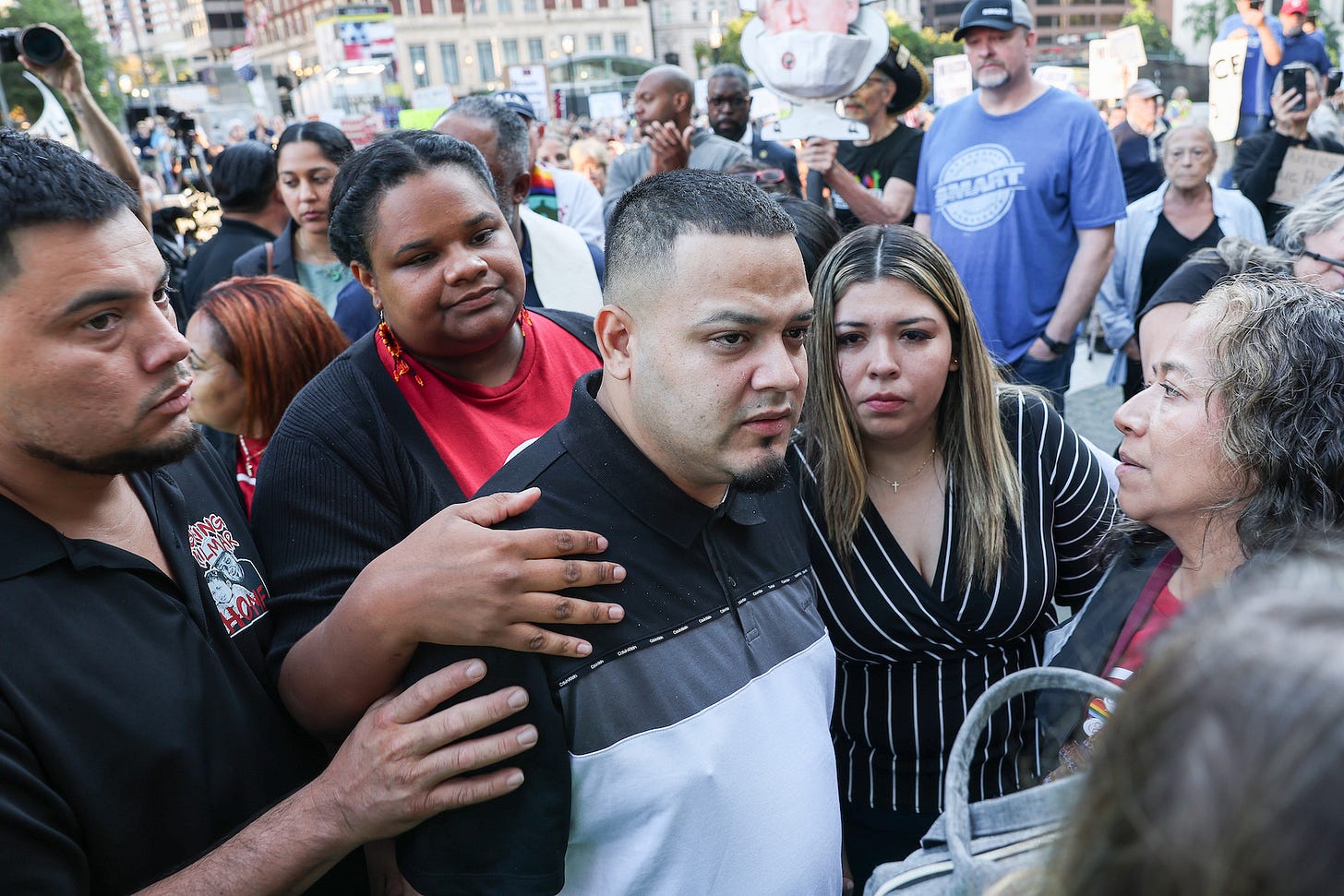Judge doubts Kilmar Abrego Garcia has final deportation order
The government's fourth effort to whisk Abrego to a faraway African nation seems bound to flop.

Between travel, lodging, transcripts, and other costs, on-the-ground coverage requires support. Subscribers are sustaining this newsletter’s week-long live coverage in major cases.
If you haven’t already, and have the means, consider becoming a subscriber.
The Trump administration’s fourth effort to deport Kilmar Abrego Garcia to a faraway African nation hit a basic stumbling block on Thursday.
During an evidentiary hearing, a federal judge could not confirm that the government obtained a final order of removal.
“If your honor finds there’s no removal order, then there’s no basis for immigration detention whatsoever,” Abrego’s attorney Andrew Rossman said during a hearing on Thursday.
U.S. District Judge Paula Xinis grilled senior Justice Department lawyer Drew Ensign on the matter. Ensign cited a document in the record, but Xinis told him that the file had no indication that it ordered Abrego’s removal.
“Not in so many words, your honor,” Ensign said.
“Not at all,” Xinis shot back.
Ensign said that an immigration judge “meant” to order Abrego’s removal.
Whatever the immigration judge meant, Xinis said: “This doesn’t look anything like [a removal order]. It’s not even close.”
The Supreme Court precedent of Zadvydas v. Davis bars indefinite immigration detention, generally imposing a 90-day limit after a final order of removal, subject to certain exceptions. It’s a key precedent Abrego’s lawyers argue for his release.
“Quite a journey”
In the words of one of Abrego’s lawyers in court, “It’s been quite a journey.”
This past March, Trump’s Department of Homeland Security hustled Abrego out of the country to a brutal terrorism prison in El Salvador, where a court order blocked his removal. After five court orders demanding his return, the government returned him to the United States for prosecution on allegations that he smuggled immigrants in 2022.
Once Abrego won the right to pre-trial release, the government offered Abrego a plea deal that would end in his deportation to Costa Rica. Prosecutors reneged on that offer once Abrego decided to defend himself at a trial. Immigration authorities put him in detention immediately following his release and have fought for months to avoid a trial entirely by deporting Abrego to a series of African countries: Uganda, Eswatini, Ghana and finally, Liberia.
The first three countries publicly refused to accept Abrego, who has no ties to any of those nations.
Liberia, a country with a blotted human rights record, agreed to accept Abrego.
After his initial rejection of the plea officer, Abrego agreed to be deported to Costa Rica, which promised to respect Abrego’s human rights and not send him back to El Salvador.
The government has since refused to honor that request, insisting upon other countries where Abrego says that he fears persecution. Xinis confirmed that the option remains on the table.
“If the government wants to moot, Abrego is still willing to go to Costa Rica. Is that correct?” Xinis said.
“Yes, your honor,” Rossman agreed.
“This witness said nothing”
Early in the hearing, senior Immigration and Customs Enforcement official John Edward Cantu testified that a State Department lawyer wrote a paragraph of his declaration.
Cantu, the Acting Assistant Director for ICE’s Removal Division, added that he didn’t understand certain words the lawyer used.
Judge Xinis appeared taken aback by the revelation, and she ordered the unsealing of his declaration, which is not currently public.
Cantu had been called, in part, to attest that Costa Rica is no longer available as an option, but Xinis said that his actual testimony didn’t support that.
“This witness said nothing today,” Xinis said.
Ensign argued that Abrego’s willingness to accept Costa Rica shows that he has an order of removal.
“Not necessarily,” Xinis shot back. “It’s a concession because he’s been to [El Salvador terrorism prison] CECOT and back.”
“You’re dealt a hand and you play it the best you can,” the judge added later.
If she finds there is no final deportation order, Xinis said she believes: “We’re done.” Abrego’s lawyers have asked the judge to release their client from immigration custody or short of that relief, keep an injunction in place blocking his deportation until the government can meet the lawful requirements. Xinis said she now considers the record closed and will issue a ruling at a later time.
If Abrego avoids deportation, he will stand trial on Jan. 27, 2026.



Adam, I appreciate your update and staying on top of this miscarriage of justice.
Thank you Adam. The cruel treatment of Kilmar Abrego Garcia needs to be brought to a just end and either allow him to stay in the USA, or go to Costa Rica (if he so wishes) and reunite with his family. Liberia is an absurd option. He deserves due process as the law demands. From a Brit in Spain.